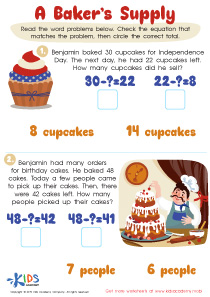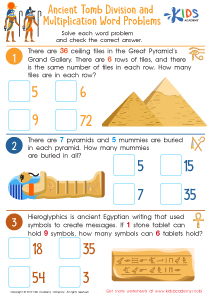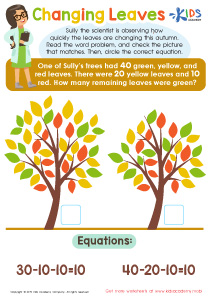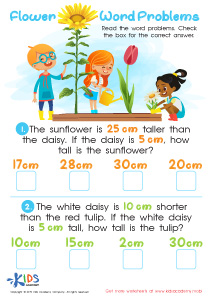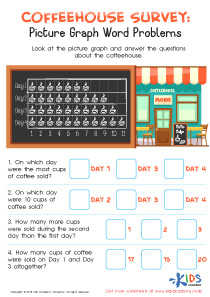Learning and Homeschool Easy Time Word Problems Worksheets With Answer Keys for Kids
1 filtered results
-
From - To
Answer Keys for Easy Time Word Problems Worksheets
Introducing our Easy Time Word Problems worksheets, the perfect addition to your learning homework sheets collection! Designed to bolster early time-telling skills, these worksheets are crafted for young learners to effectively grasp the concept of time through engaging and clear problem-solving exercises. Each sheet is thoughtfully developed to challenge and inspire children, enhancing their mathematical understanding and confidence. Ideal for both classroom and home use, our worksheets offer a structured approach to learning that fosters independence and mastery in reading clocks and understanding intervals. Help your students excel with this essential educational tool.
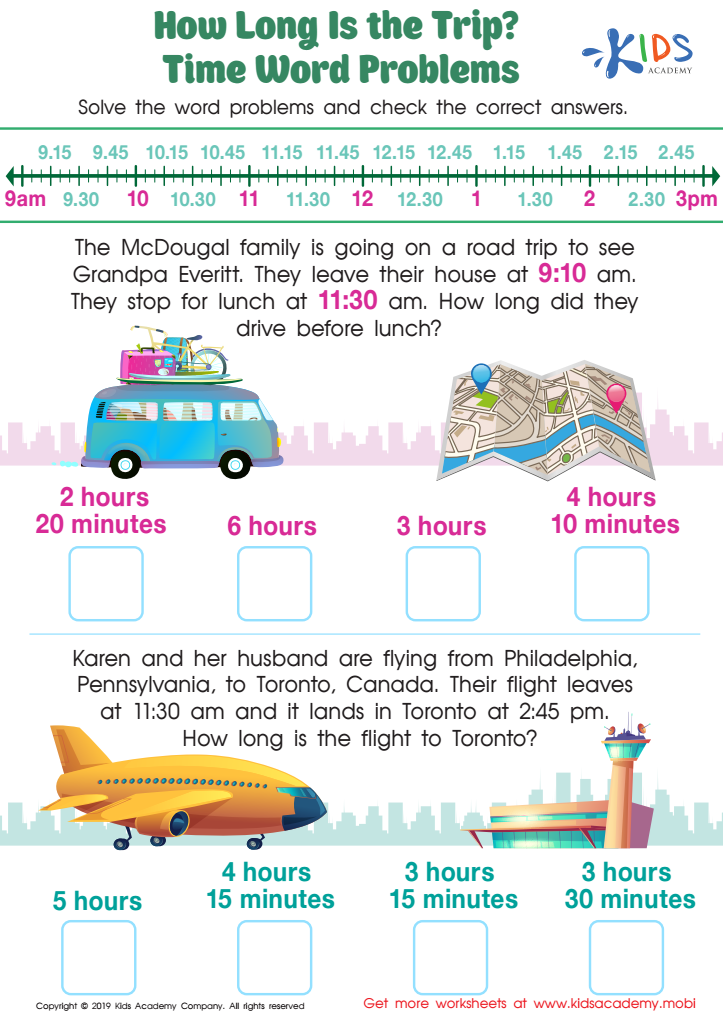

How long is the Trip? Time Word Problems Worksheet
Easy worksheets on Time Word Problems are a highly effective educational tool that play a crucial role in the mathematical development of students. These educational worksheets are designed to help learners of all ages understand and manage one of the most practical aspects of everyday life: time. By integrating these worksheets into the learning process, educators can provide a solid foundation for more complex mathematical concepts while simultaneously improving students' problem-solving and critical thinking skills.
Time word problems can cover a range of topics, from calculating the duration of activities to understanding time in different formats, like the 24-hour clock and AM/PM. For younger students, these problems typically begin with simple concepts such as reading clocks or calculating the end time of an event, gradually progressing to more complex scheduling and elapsed time problems. This step-by-step approach ensures that students build confidence and competency at a comfortable pace.
Here’s why easy worksheets on Time Word Problems are so beneficial:
-
Relevance to Everyday Activities: Time is a universal aspect of daily life. Whether it's scheduling an appointment, catching a bus, or planning time to study, understanding how to calculate time efficiently is essential. Educational worksheets that focus on time help students apply what they learn in real-world scenarios, making their learning experience more relevant and engaging.
-
Foundation for Advanced Mathematical Skills: Time word problems often require the application of basic arithmetic—addition, subtraction, multiplication, and division. By regularly practicing these skills in a contextual setting, students not only master time management but also strengthen their overall mathematical abilities. This solid foundation is crucial as they progress to more advanced topics in mathematics.
-
Development of Problem-Solving Skills: Time word problems challenge students to think critically and devise strategies to find solutions. These problems often present scenarios where multiple steps are needed to reach an answer, helping students develop a systematic approach to problem-solving. This skill is invaluable across many areas of study and professional life.
-
Enhanced Time Management: By working through time-related problems, students inherently learn the value of time management. They become more aware of how time flows and how long tasks may take, which can help them plan their own activities better, both in school and at home.
-
Boosts Confidence: Educational worksheets designed at an easy level are particularly good for building confidence. They provide a low-stress environment where students can learn through trial and error, which is crucial for young learners. As students become more confident in solving these problems, their overall attitude towards more challenging mathematical concepts tends to improve. This positive reinforcement is essential in maintaining a lifelong interest and proficiency in mathematics.
-
Adaptability and Customization: One of the great advantages of educational worksheets is their adaptability. Teachers can customize worksheets to match the learning pace and level of their students. For instance, they can modify the complexity of the problems, integrate them with other subjects such as geography or history, or focus on particular skills that need reinforcement. This flexibility allows for a more personalized learning experience that can cater to diverse learning styles and needs.
-
Interactive and Engaging Learning: Easy worksheets on Time Word Problems can also incorporate fun elements like puzzles, games, and real-life scenarios, making the learning process more interactive and enjoyable. Engagement in the learning process increases when students find the material relatable and fun, which can lead to better retention of information and a more profound understanding of the subject matter.
-
Facilitation of Assessment and Feedback: Worksheets provide a straightforward means for educators to assess progress and understand individual student needs. By reviewing the outcomes of these worksheets, teachers can provide targeted feedback, helping students to improve specific areas where they may struggle. This ongoing assessment is crucial for the continuous development of a student’s skills.
By leveraging the inherent benefits of easy worksheets on Time Word Problems, educators can effectively nurture essential life skills in their students. These educational tools not only help in understanding the concept of time but also foster a range of cognitive skills including logical reasoning, accuracy, adaptability, and problem-solving. Given their direct connection to everyday life, their role in education is both fundamental and profound, making them an indispensable part of modern teaching strategies.
 Assign to the classroom
Assign to the classroom





.jpg)
